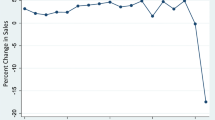Abstract
Enterprise philanthropy is practiced in a very unique and rudimentary form in China. Based on a unique random survey data on 3837 Chinese private enterprises conducted in 31 provinces of China in 2006, I find the significant positive relationship between enterprise philanthropy donation and enterprise profitability, and the result supports the political and institutional power view of enterprise philanthropy in the latest development of China. Simply put, Chinese private enterprises carried out philanthropy activities to better protect property rights and nurture political connections, which in turn, leads to better enterprise profitability. The␣result is even stronger in institutions weaker provinces.
Similar content being viewed by others
Abbreviations
- ROA:
-
Return on assets
- ROE:
-
Return on equity
- R&D:
-
Research and Development
- SOE:
-
State-owned enterprise
- RMB:
-
Chinese currency abbreviation (Renminbi)
References
Agrawal, A., Knoeber, C.K.: 2001, ‘Do some outside directors play a political role ‘, Journal of Law and Economics 44, 179–198.
Allen, F., Qian, J., Qian, M.: 2005, Law, ‘finance, and economic growth in China’, Journal of Financial Economics 77, 57–116.
Bai, C., Lu, J., Tao, Z.: 2006, ‘An Empirical Study on the Access to Bank Loans by Private Enterprises in China’, Economics of Transition 14(4), 611-628.
Brammer, S. and Millington, A: 2008. ‘Does it pay to be different An analysis of the relationship between corporate social and financial performance’ Strategic Management Journal, 29: 1325–1343 (2008).
Brandt, L., Li, H.: 2003, ‘Bank discrimination in transition countries: ideology, information or incentives’, Journal of Comparative Economics 31 (3), 387–413.
Cull, R. and L. Xu : 2005, ‘Institutions, Ownership, and Finance: the Determinant of Profit Reinvestment among Chinese Firms’, Journal of Financial Economics 77, 117–146.
Demirguc-Kunt, A., Maksimovic, V.: 1998, ‘Law, finance and enterprise growth’, Journal of Finance 53, 2107–2137.
Faccio, M.: 2006, ‘Politically connected enterprises’, American Economic Review 96 (1), 369–386.
Fan, G. and X. Wang: 2007, NERI Index of Marketization of China’s Provinces 2006 Report (Economic Science Press, Beijing) (in Chinese).
Fisman, R.: 2001, ‘Estimating the value of political connections’, American Economic Review 91, 1095–1102.
Frye, T., Zhuravskaia, E.: 2000, ‘Rackets, regulations and the rule of law’, Journal of Law, Economics, and Organization 16, 478–502.
Guriev, S.: 2004, ‘Red tape and corruption’, Journal of Development Economics 73, 489–504.
Hellman, J.S., Jones, G., Kaufmann, D.: 2003, ‘Seize the state, seize the day: state capture, corruption, and influence in transition’, Journal of Comparative Economics 31, 751–773.
Johnson, S., Kaufmann, D., McMillan, J.,Woodruff, C.: 2000, ‘Why do enterprises hide? Bribes and unofficial activity after communism’, Journal of Public Economics 76, 495–520.
Johnson, S., McMillan, J., Woodruff, C.: 2002, ‘Property rights and finance’, American Economic Review 92 (5), 1335–1356.
Johnson, S., Mitton, T.: 2003, ‘Cronyism and capital controls: evidence from Malaysia’, Journal of Financial Economics 67, 351–382.
Khwaja, A., Mian, A.: 2005, ‘Do lenders favor politically connected enterprises? Rent provision in an emerging financial market’, Quarterly Journal of Economics 120 (4), 1371–1411.
La Porta, R., Lopez-de-Silanes, F., Shleifer, A., Vishny, R.: 1998, ‘Law and finance’, Journal of Political Economy 106, 1113–1155.
La Porta, R., Lopez-de-Silanes, F., Shleifer, A., Vishny, R.: 1999, ‘The quality of government’, Journal of Law, Economics, and Organization 15, 222–279.
La Porta, R., Lopez-de-Silanes, F., Shleifer, A., Vishny, R.: 2000, ‘Investor protection and corporate governance’, Journal of Financial Economics 58, 141–186.
Levine, R.: 1999, ‘Law, finance, and economic growth’, Journal of Financial Intermediation 11, 1–30.
Li, H., Meng L., Wang Q. and Zhou, L.: 2007, ‘Political Connections, Financing and Firm Performance: Evidence from Chinese Private Entrepreneurs’, Journal of Development Economics 87(2), 283-299.
McMillan, J.: 1997, Markets in transition. In: Kreps, David M.,Wallis, Kenneth F. (Eds.), Advances in Economics and Econometrics, vol.II, (Cambridge University Press, Cambridge), pp. 210–239.
McMillan, J., Woodruff, C.: 1999, ‘Interenterprise relationships and informal credit inVietnam’, Quarterly Journal of Economics 114 (4), 1285–1320.
McMillan, J., Woodruff, C.: 2002, ‘The central role of enterprises in transition countries’, Journal of Economic Perspectives 16 (3), 153–170.
McWilliams, A. and Siegel, D: 2000. ‘Corporate Social Responsibility and Financial Performance: Correlation or Misspecification?’ Strategic Management Journal 21, 603-609.
Meyer, J. W. and B. Rowan: 1977, ‘Institutional Organizations: Formal Structure as Myth and Ceremony’, American Journal of Sociology 83, 340–363.
Ramalho, R.: 2007, The Persistence of Corruption: Evidence from the 1992 Presidential Impeachment in Brazil. Working Paper, World Bank.
Sánchez, C. M.: 2000, ‘Motives for Corporate Philanthropy in El Salvador: Altruism and Political Legitimacy’, Journal of Business Ethics 27: 363–375.
Shan, L., L. Gan and T. Zheng: 2009, Corporate Donations and Economic Incentives: An Empirical Study Based on Donations Following the 5.12 Earthquake in China. Working Paper (in Chinese), Southwest University of Finance and Economics of China.
Shleifer, A. and Vishny, R: 1994, ‘Politicians and firms’, Quarterly Journal of Economics, 109(4), pp. 995–1025.
Snyder Jr., J.M.: 1990. ‘Campaign contributions as investments: The U.S. House of Representatives, 1980–1986’, Journal of Political Economy 98 (6), 1195–1227.
Author information
Authors and Affiliations
Corresponding author
Rights and permissions
About this article
Cite this article
Su, J., He, J. Does Giving Lead to Getting? Evidence from Chinese Private Enterprises. J Bus Ethics 93, 73–90 (2010). https://doi.org/10.1007/s10551-009-0183-0
Received:
Accepted:
Published:
Issue Date:
DOI: https://doi.org/10.1007/s10551-009-0183-0




